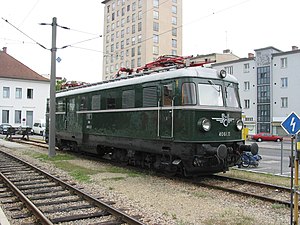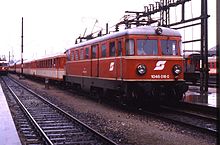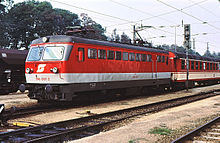ÖBB 4061
| ÖBB 4061 / ÖBB 1046 / ÖBB 1146 | |
|---|---|
|
Museum locomotive 4061.13, restored to its original condition, in Krems
|
|
| Numbering: | 4061.01-25 1046.01-25 1146.01-02 |
| Number: | 25th |
| Manufacturer: | WLF, ABES |
| Year of construction (s): | 1956 |
| Retirement: | 2003 |
| Axis formula : | Bo'Bo ' |
| Length over buffers: | 16,170 mm |
| Height: | 3,905 mm |
| Width: | 3,112 mm |
| Trunnion Distance: | 8,100 mm |
| Bogie axle base: | 3,200 mm |
| Service mass: | 67 t |
| Top speed: | 125 km / h |
| Hourly output : | 1,600 kW |
| Continuous output : | 1,400 kW |
| Starting tractive effort: | 120 kN |
| Wheel diameter: | 1,040 mm |
| Drive: | Sécheron slats |
The ÖBB 4061 series was an electric locomotive series of the Austrian Federal Railways . The locomotives in this series have undergone significant changes over the years.
history

The first locomotive was delivered in 1956. At that time it was known as 4061 , which corresponded to its intended purpose as a luggage railcar: 40 numbers are provided by the ÖBB for electric railcars. The vehicle was equipped with a luggage compartment with large sliding doors and a driver's compartment and was designed for city express traffic on valley sections, where you could do without the luggage cart.
The 4061.01 was put into operation in December 1956 in Vienna- West. The entire series was delivered in two construction series, which differed slightly. Vehicles 4061.13 and 14 received an Indusi facility (today PZB) in 1964 ; they were the first ÖBB vehicles to be equipped with this facility. Equipped in this way, they could transport the Mozart express train from Vienna to Munich .
In May 1976, the machines were redrawn from 4061 to 1046 by only remounting the metal numbers. They had only been used as locomotives for a long time, so this redrawing was an obvious step.
In 1981 the ELIN company was given the 1046.25 as a test vehicle for a future two-frequency three-phase current locomotive. Since the luggage compartment offered sufficient space for the installation of the technical equipment, it was particularly suitable for these tests.
As a result of these attempts, the sub-series 1146.001–002 was created in 1986 by converting the two machines 1046.03 and 17 . The old locomotive bodies were replaced by new ones, frames, drives and drives were retained. The three-phase current technology brought an increase in output of 25% compared to the 1046 and the possibility of driving under the 15 kV / 16⅔ Hz and 25 kV / 50 Hz power systems. The top speed could also be increased to 140 km / h. Furthermore, these vehicles were the first ÖBB locomotives to have a double traction control based on time division multiplex technology . With this series a foundation stone was laid for the ÖBB series 1014/1114 , and the findings could be transferred to this successor series.
With the two-frequency technology, cross-country locomotives to Hungary were possible for the first time . The two 1146s were mostly to be found on the northern and eastern tracks . They ran the trains EC 8/9 Antonín Dvořák and EC 172/173 Vindobona on the northern line to Břeclav in the Czech Republic . On the Eastern Railway they pulled the trains EC 24/25 Franz Liszt and EC 41/42 Lehár to Budapest .
The condition of the remaining machines in the 1046 series deteriorated and, as the demand for locomotives increased, a large-scale conversion campaign began in 1987. The locomotive body was completely rebuilt, the luggage compartment was omitted, and the space gained could now be better used for the mechanical systems. The driver's cabs were also extended. Components from newer generations of locomotives were used in order to reduce the stock of spare parts and to make the conversion more economical. The conversion program ended in 1994 after 13 converted machines. These were 1046.001, 005–009, 012, 016, 019, 021–024.
In 1993, the seven remaining locomotives with old kits, 1046.002, 004, 013-015, 018 and 020, were parked. The 1046.013 was preserved, was restored in the main ÖBB workshop in Floridsdorf , painted green and used as a luggage railcar under the original road number 4061.13 in front of nostalgic trains. Today it is used by the association "Club 1018" for special trips that are organized to finance the refurbishment of the association's name- giving ÖBB machine 1018.05 .
In 1998 the two dual system locomotives 1146 were retired.
1146.002 was transferred from Linz to Wulkaprodersdorf station on November 5, 1998, where it was installed as a stationary preheating system . The pantographs and the headlights were removed and the corresponding openings were clad. For the time being, the vehicle kept its original paintwork including the company number, as it still belonged to the ÖBB and in return the GySEV provided the traction current free of charge. Later, the locomotive was taken over and repainted in green and yellow, which was given the company number 011.37. The scrapping took place in 2014.
In 2003 the last copies of the 1046 series were retired.
The 1046.001 was handed over to the Austrian Society for Railway History and is operational. The inoperable 1046.07 and 1046.20, which still have the old locomotive body, have also been preserved.
Constructive features
The locomotives were equipped with a Sécheron lamella drive. The locomotives were delivered with two headlights, the third headlight was retrofitted later.
Trivia
The 4061 and 1046 series were first produced as a 1:87 scale model ( nominal size H0 ) by Klein Modellbahn , further models followed by the manufacturers Rivarossi and Roco . On a scale of 1: 160 ( nominal size N ), several versions appeared in 2015 under the Arnold von Hornby brand .
Areas of application
- Austrian Western Railway
- Austrian Southern Railway (section Vienna - Bruck an der Mur) or railway line Bruck an der Mur - Leoben
- Vienna – Břeclav railway line
- Franz-Josefs-Bahn
- Pressburger Bahn
- Pottendorfer line
- Rudolfsbahn (St. Michael - Amstetten section)
literature
- Klaus-J. Vetter: The great manual for electric locomotives . Sconto, Munich 2003, ISBN 3-7654-4066-3 .
- Markus Inderst : Picture atlas of the ÖBB locomotives. All traction vehicles of the Austrian Federal Railways. GeraMond, Munich 2010, ISBN 978-3-7654-7084-4 .
- Peter Kuderna: ÖBB series 4060/1046/1146 . Bahn im Film, Vienna 2012, ISBN 978-3-9503096-1-4 .
Web links
- Pictures of the series 4061
- Club 1018 - Association for the maintenance and care of nostalgic locomotives and railcars



